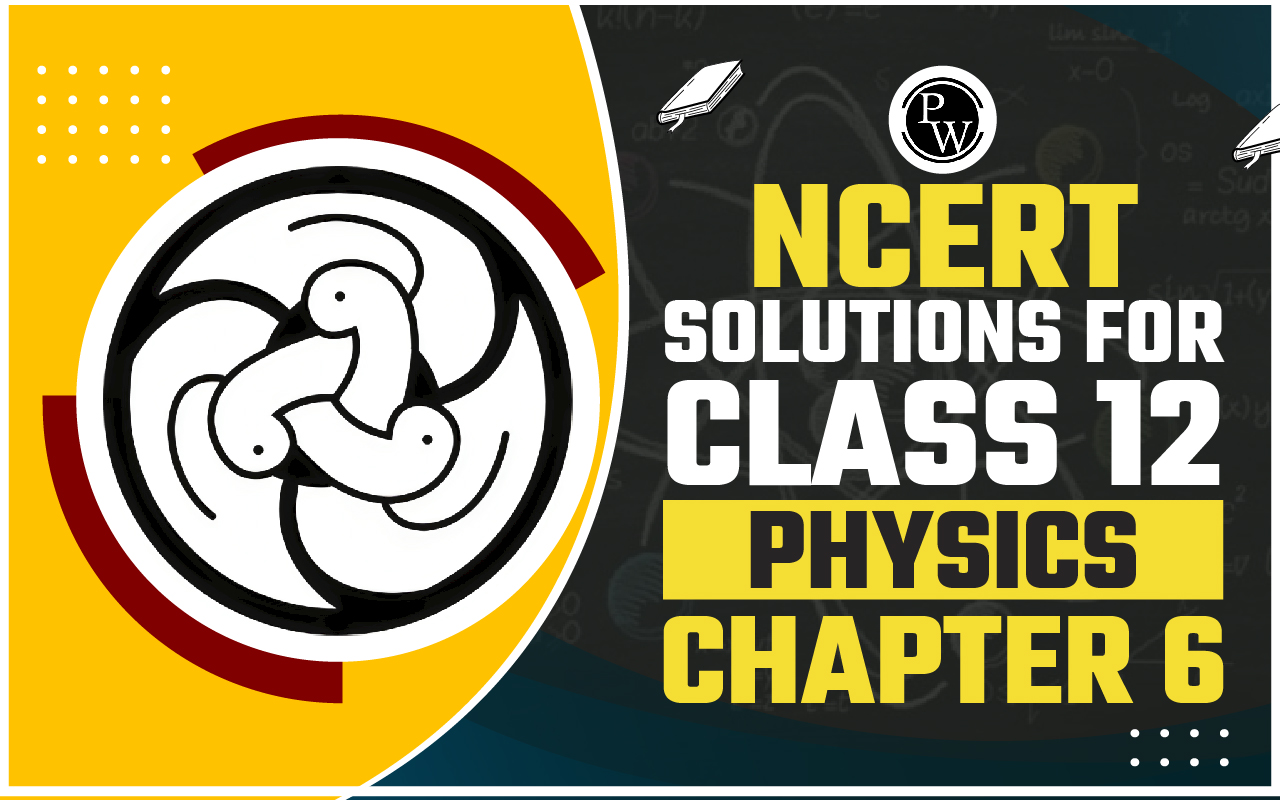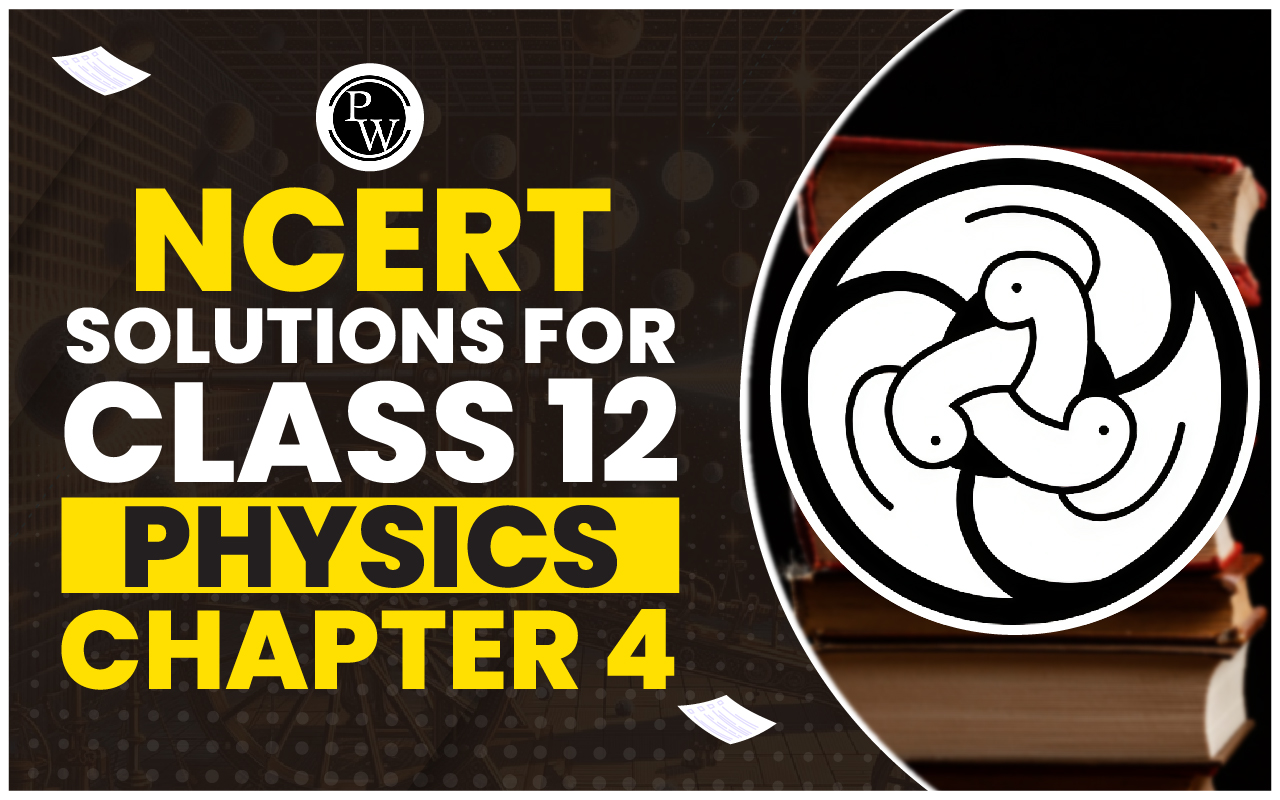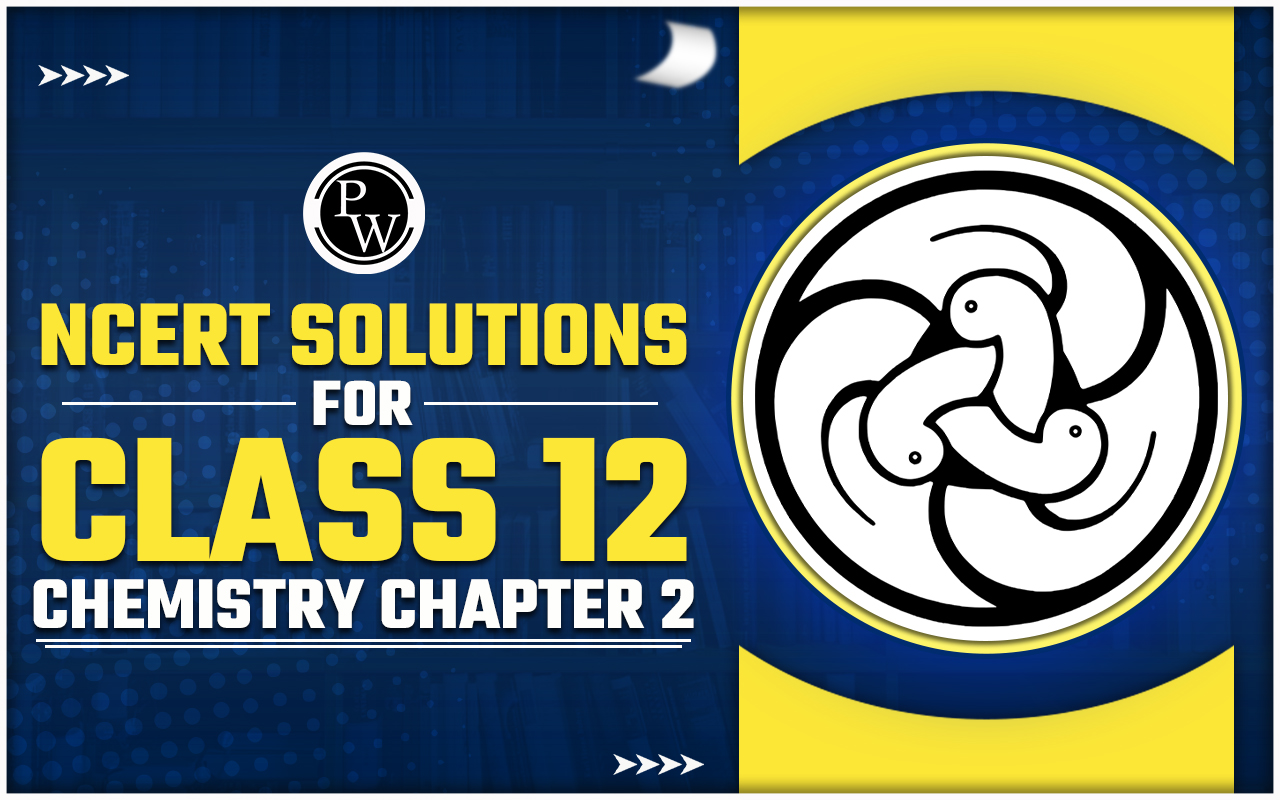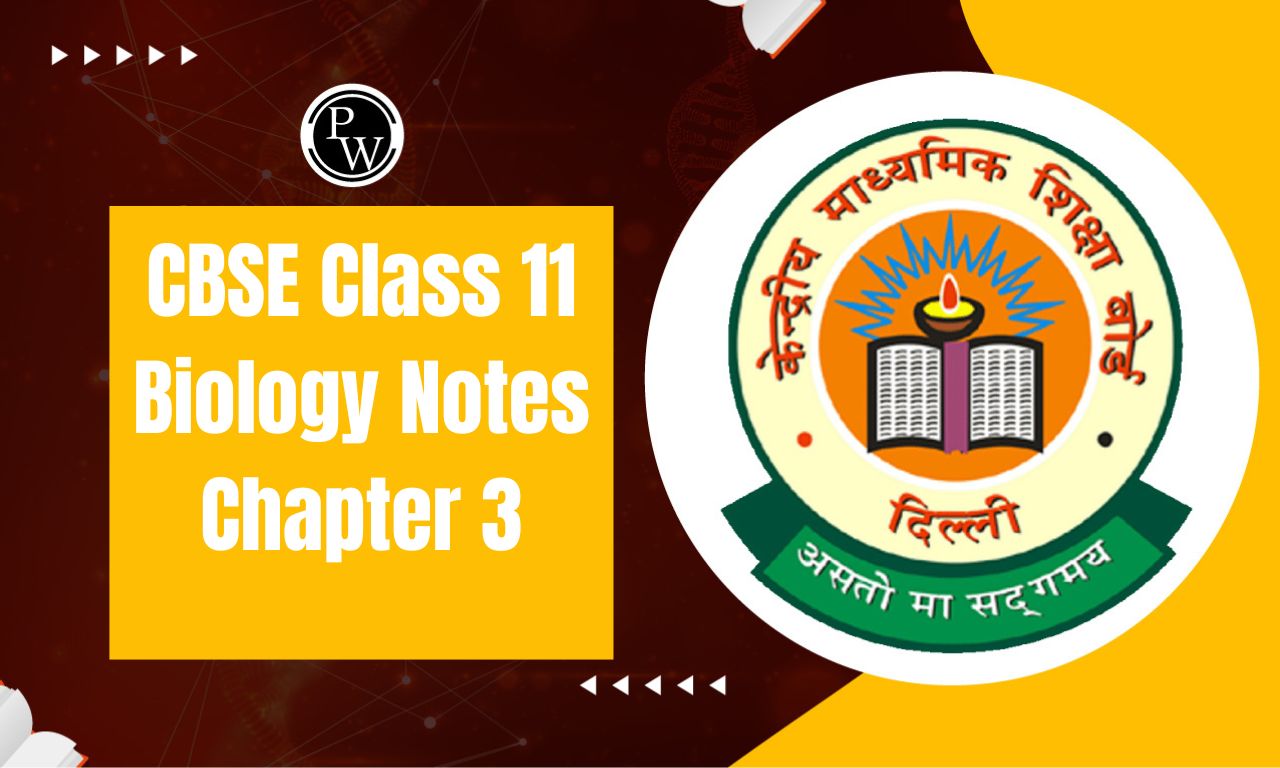
CBSE Class 11 Biology Notes Chapter 14: For science students in class 11, biology is an essential subject. The biology syllabus for class 11 has been updated by the Central Board of Secondary Education (CBSE) to include several significant topics.
The syllabus covers a variety of biological fields, including physiology, zoology, and botany. Plant respiration is covered in CBSE Class 11 Biology Notes Chapter 14. It is an essential Botany topic. As an overview of botany, you ought to read this chapter with sincerity. For a deeper comprehension, you might review the notes from Plant Respiration in Class 11. The respiration in plants class 11 notes help students in getting ready for tests.Respiration in Plants Class 11 Notes Overview
One of the basic functions that all living things perform is respiration. Some macromolecules derived from food undergo oxidation to produce all the energy needed for living functions. Through the process of photosynthesis, which involves capturing light energy and converting it to chemical energy, autotrophs can synthesize their food. Food is necessary for oxidation in non-green cells, various tissues, and green plants. Food can therefore be moved to all the non-green areas. Because they are heterotrophic, animals eat plants to meet their nutritional needs. The topic of the chapter is cellular respiration. It is the process by which dietary components break down inside of cells to release energy. The energy currency of a cell, ATP, is created by trapping this energy.CBSE Class 11 Biology Notes Chapter 14 PDF
For students doing science in class 11, biology is a required subject. For the sake of both future ease and their final exam, you must read biology. The syllabus for Biology 11 comprises a few introductory chapters covering several biological areas. There are three main sections to the syllabus: physiology, zoology, and botany. Under the section on botany is Chapter 14. You will study the various structural and functional aspects of plants in the botany section. The plant respiratory system is covered in CBSE Class 11 Biology Notes Chapter 14.CBSE Class 11 Biology Notes Chapter 14 PDF
CBSE Class 11 Biology Notes Chapter 14
Respiration is the process through which oxygen and complex organisms mix and disintegrate to create simpler molecules and release energy. It causes carbon dioxide and water to be produced. It was Dutrochet who first used the word "respiration." Cellular respiration is the process by which complex molecules containing C-C bonds undergo oxidation, producing energy as a byproduct. There are two types of amphibolic processes in respiration: catabolic and anabolic. Numerous different respiratory intermediates are used in the synthesis of other compounds. Acetyl coenzyme A is used to synthesize fatty acids and gibberellic acid; succinyl coenzyme A is used to synthesize chlorophyll, phytochrome, and cytochrome; and oxaloacetic acid and alpha-ketoglutaric acid are used to synthesize amino acids, such as aspartic acid, glutamic acid, etc. Respiratory substrates are created during respiration, following the oxidation of organic materials. Two categories of cellular respiration are distinguished based on the kinds of substrates used:-
Floating Respiration: It is a common type of respiration whereas substrate, fat, or carbohydrates are used.
-
Protoplasmic Respiration: This type occurs when plants are starved and here as substrate proteins are used.
Do Plants Breathe
In the case of plants, there is no unique breathing or gas exchange system. During respiration, plants need oxygen and release carbon dioxide. Plants use their lenticels and stomata to facilitate the exchange of gases, with only a small amount of gases moving from one area of the plant to another. Plants don't need a lot of gases to exchange or multiple requirements to proceed through respiration. The majority of the time when they conduct gaseous exchange is during photosynthesis. Since oxygen is released during photosynthesis together with energy, it is not required to come from the outside world. The synthesis of biomolecules and other biological processes can make use of the 50% of total energy generated during respiration. One can use the carbon created during respiration as a precursor to aid in the creation of other chemicals found in the cell.Types of Respiration
Depending on whether oxygen is present during cellular respiration, there are two types of respiration. Anaerobic and aerobic respiration are the two types. Salt respiration increases when plants exhibit active absorption.
The process of ripening fruits is known as climatic respiration.
E.g.: Apple, Mango, etc.
Salt respiration increases when plants exhibit active absorption.
The process of ripening fruits is known as climatic respiration.
E.g.: Apple, Mango, etc.
Aerobic Respiration
It is the process by which carbon dioxide and water are created when raw materials, including oxygen, are used. The equation is shown below: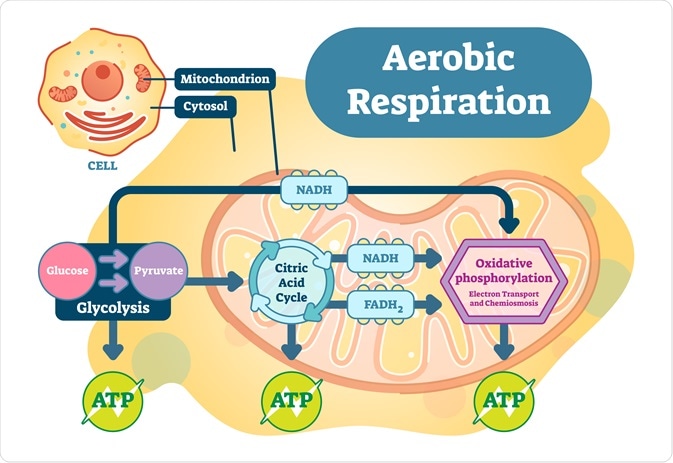 It happens in the cell's mitochondria when energy, or about 2870 kJ, is released.
There are two primary phases of aerobic respiration: the citric acid cycle and glycolysis.
Kollicker made the initial discovery of it in the striated muscles of insects.
On the other hand, C. Benda coined the term mitochondria.
Hoyeboom postulated that the mitochondria serve as the site of cellular respiration.
Mitochondria are referred to as the semi-autonomous organelles since they have their ribosomes, DNA, RNA, and proteins. They are found as endosymbionts, symbiotic relationships inside eukaryotic cells.
It happens in the cell's mitochondria when energy, or about 2870 kJ, is released.
There are two primary phases of aerobic respiration: the citric acid cycle and glycolysis.
Kollicker made the initial discovery of it in the striated muscles of insects.
On the other hand, C. Benda coined the term mitochondria.
Hoyeboom postulated that the mitochondria serve as the site of cellular respiration.
Mitochondria are referred to as the semi-autonomous organelles since they have their ribosomes, DNA, RNA, and proteins. They are found as endosymbionts, symbiotic relationships inside eukaryotic cells.
Glycolysis
It is the initial stage of respiration, both anaerobic and aerobic. It involves a sequence of enzyme-catalyzed events that result in the creation of pyruvic acid when the glucose oxidizes. Because of the names of the biologists who found it—Gustav Embden, Otto Meyerhof, and J. Paranas—it is often referred to as the EMP pathway.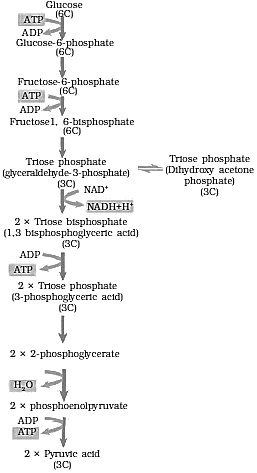
Glucose forms two molecules of pyruvic acid after it undergoes oxidation.
Glycolysis includes two major phases.
-
Preparatory phase and cleavage
-
Oxidative and payoff phase.
Fermentation
Anaerobic respiration, also known as fermentation or zymosis, is the process that takes place in the absence of oxygen and involves the incomplete oxidation of food ingredients that produce CO2 and ethanol as end products. Yeast aids in the completion of the procedure. Shank was the one who came up with the name "fermentation," while Gay Lussac was the one who initially discovered the process.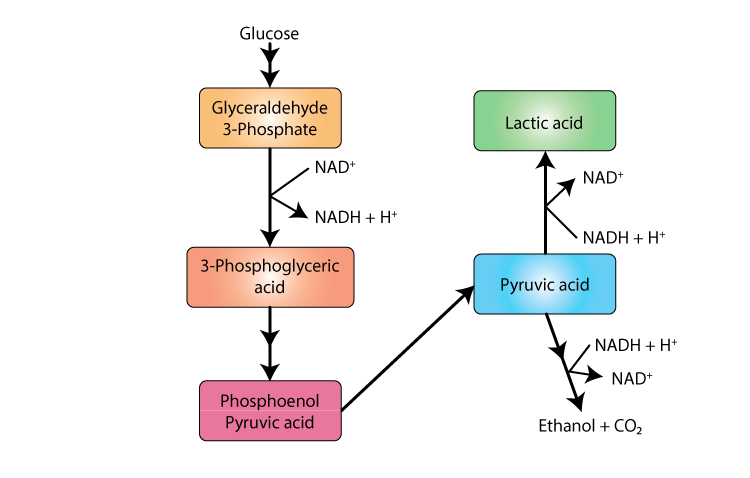 Fermentation takes place in a variety of organisms, such as many prokaryotes, unicellular eukaryotes, and seeds that germinate in an anaerobic environment. Alcoholic and lactic acid fermentation are the two different types of fermentation processes.
Fermentation takes place in a variety of organisms, such as many prokaryotes, unicellular eukaryotes, and seeds that germinate in an anaerobic environment. Alcoholic and lactic acid fermentation are the two different types of fermentation processes.
Alcoholic Fermentation
Carbon dioxide and ethanol (ethyl alcohol) are the products of it. It takes two steps: first, glucose molecules undergo glycolysis, which yields pyruvic acid. Pyruvic acid is subsequently converted to carbon dioxide and ethanol. The two actions are as follows: An enzyme known as pyruvic acid decarboxylase aids in the conversion of pyruvic acid into carbon dioxide and acetaldehyde. The process of acetaldehyde, which yields ethanol and carbon dioxide, is aided by an enzyme known as alcohol dehydrogenase as well as a coenzyme.Aerobic respiration
Glycolysis produces end products from glucose that include Pyruvic acid is the final byproduct of glycolysis and is a three-carbon molecule that is found in the cell's cytoplasm.The Main Events are
By gradually removing the hydrogen atoms from the pyruvic acid, the acid is fully oxidized. Following the ATP synthesis, the electrons will proceed to migrate in the direction of the oxygen molecules, with this process occurring inside the cell's inner mitochondrial membrane. Subsequently, the carbon dioxide molecules are eliminated within the cell's mitochondrial matrix.Tricarboxylic Acid Cycle
Following the full oxidation of pyruvic acid, which happens in a sequence of step-by-step reactions and needs oxygen, this cycle involves the creation of carbon dioxide and water. This process occurs within the cell's mitochondria. Since Hans Krebs followed the steps, the cycle bears his name, the Krebs cycle. The cycle is also known as the citric acid cycle since its initial constituent is tricarboxylic acid, which is also known as citric acid. since the cycle consists of three acids, it is also known as the tricarboxylic acid cycle. In the TCA cycle, acetyl coenzyme A serves as the respiratory substrate, and acetic acid, a four-carbon complex, serves as the acceptor molecule. This cycle consists of two decarboxylation reactions (removing CO2) and four dehydrogenation reactions (removing hydrogen). Here, carbon dioxide will be produced as a result of the coenzyme reduction. Together with four carbon oxaloacetic acids, one molecule of acetyl coenzyme A is involved in the synthesis of citric acid, a six-carbon chemical. Citrus synthase is an enzyme that helps this reaction happen. The creation of CoA is the result of this reaction, which needs a water molecule. With the aid of a water molecule, isocitric acid isomerizes to generate citric acid.Benefits of CBSE Class 11 Biology Notes Chapter 14
The first year of higher education is class 11. You will study various foundational subjects for their higher education in this course. You must also show up for their final exam. You should therefore take each section and subject of their curriculum seriously. You must first finish reading their syllabus. You should then begin going over the full syllabus one more time. You can refer to the CBSE class 11 biology chapter 14 notes for better exam preparation. Notes from class 11 The advantages of respiration in plants are- A concise chapter overview is given in the revision notes.
- Students can use the notes to prepare for exams at the last minute.
- The essential elements of the chapter are explained to the pupils.
- The students will grasp the subject matter well if they adhere to the revision notes.
CBSE Class 11 Biology Notes Chapter 14 FAQs
What is respiration in plant notes class 11th bio chapter 14?
What are the important notes for respiration in plants?
What is the name of chapter 14 in biology class 11?



